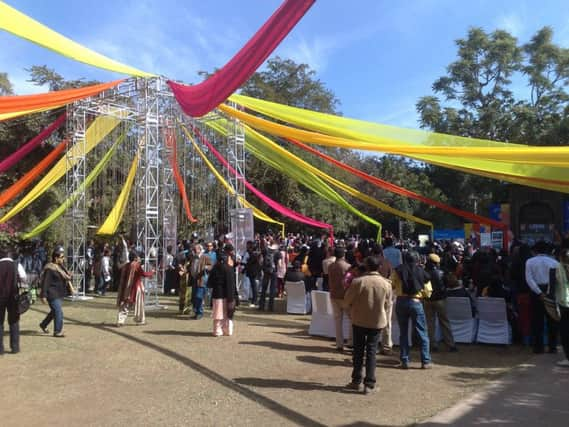Jaipur Literary Festival, co-founded by a Scot, celebrates 10 years


Stepping down from the stage of the Char Bagh garden tent after a session on travel writing with Colin Thubron, author William Dalrymple is spelling for an eager Indian student the names of other greats he mentioned in his introduction: Bruce Chatwin, Patrick Leigh Fermor.
It is the fifth and final day of the Jaipur Literary Festival, which Dalrymple co-founded 10 years ago with the Indian novelist Namita Gokhale. The teeming weekend crowds are beginning to ease and the event will close with the Writers’ Ball, one of a string of stunning concerts and parties in the Pink City’s palaces and grand hotels.
Advertisement
Hide AdThe man who wrote In Xanadu at 21 has been chairing about three sessions a day but still seems full of energy. Asked to name those who could emerge from this year’s festival as future greats, he suggests Basharat Peer, the award-winning writer on Kashmir, and Tishani Doshi, a “fantastic poet”, novelist and dancer who lives on a beach in Tamil Nadu. “And Samanth Subramanian,” a friend fills in, shortlisted for the Samuel Johnson Award.
There’s certainly no shortage of talent here, and the mostly English-language event is now pushing a “translation catalogue” which will promote translation rights for eight novels by festival authors in six Indian languages.
This multi-coloured juggernaut of a festival, set in the grounds and historic outbuildings of the Diggi Palace Hotel, leaves the unprepared Briton feeling a like post-colonial Cinderella at the ball. Jaipur is now the ten-year-old grand-daddy of India’s book festivals, an utterly different beast from Edinburgh. It crams the whole Indian nation, it seems, into a riotous long weekend, with a star-studded cast and an exuberant and extraordinarily youthful crowd that runs from Delhi’s glitterati to locals just there for the scene. The theme this year is “sea of stories” and Dalrymple and the festival’s veteran producer Sanjoy Roy also hammer home its other message: Jaipur is “the world’s biggest free literary festival” and has spawned about 100 imitators. At the railway staiton, student fans sleep at night on the platform. Last year it had 47,000 “unique visitors” attending multiple sessions in what would be the equivalent of selling 270,000 individual tickets. In addition to plentiful press attention across India, it claimed dose to a billion social media impressions this year, and organisers have vowed noisily to keep it free, despite still surging numbers.
Journalists, writers, poets, Indian film and cricket stars don’t just show up here; they mouth off, and spar noisily with politicians. The festival has three open and airy pavilion tents and the small enclosed Durbar and Baithak halls, as well as a teen space. You can breeze into Marlon James for a delicious ten minutes, then head off early for a session on nudity and lewdity in Indian and Western art.
“Is he a satirist?” asks a baffled older man in a neighboring seat, after listening for some minutes to Alexander McCall Smith, on a return visit to Jaipur and generally having a good literary giggle with Dalrymple. He takes his leave, perhaps to see Bant Singh, the Dalit and a campaigner for lower caste Indians whose crusade for justice after his daughter was raped brought a beating so vicious that he lost both arms and a leg.
Stephen Fry is here, talking Wilde, but the roars of the crowd are reserved for the likes of the teasingly camp star Indian film director and actor Karan Johar, who has a new biography, telling the audience that “I love to pose and I love to pout... relationships are like mangoes; they come and go.” Or iconic cricketer Anil Kumble, with footballing legend Baichang Bhutia, joining the laughter when the moderator explains that football is played with 11 men, a ball, feet, and “no bats”.